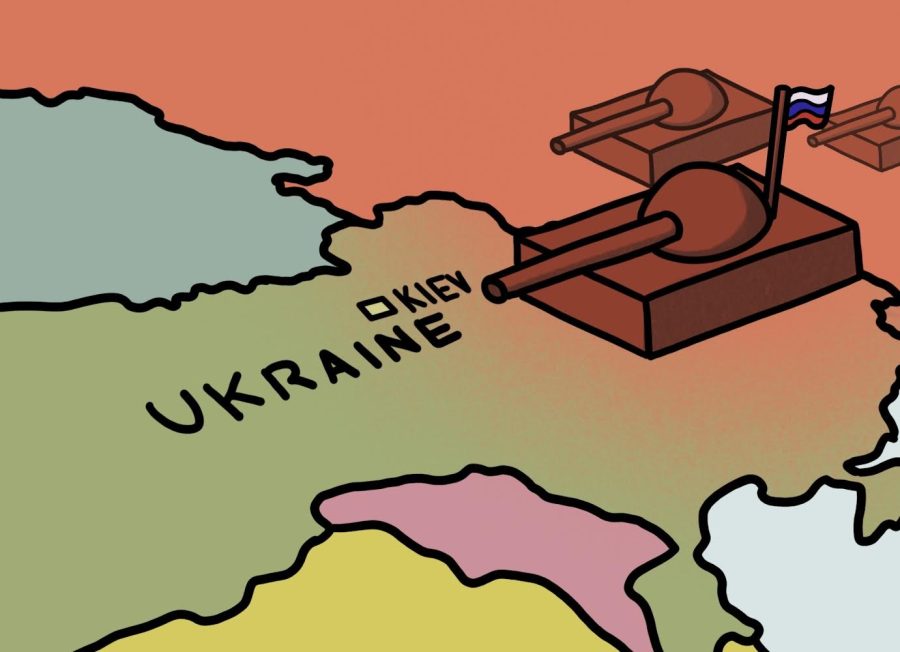Russia Launches a Full-Scale Military Invasion against Ukraine
In 1919, known as the Ukrainian Soviet Socialist Republic, Ukraine was one of 15 republics that made up the Soviet Union. But following World War II and the unsuccessful Perestroika and Glasnost of President Mikhail Gorbachev’s in the 1980’s, the Union stood on the precipice of destruction. Dissatisfaction manifested in the gradual secessions of multiple states. Coupled with the rising popularity of democratic Boris Yeltsin and the August 1991 Coup, Gorbachev was forced to resign in December 1991. The Soviet Union fell, dissolving on the 26th. Ukraine, thereafter, gained complete independence and helped found the Commonwealth of Independent States: a coalition of republics formerly part of the Soviet Union. Including Russia.
The situations were shaky at best. Despite the coalition, on February 19th, 2014, Russia illegally annexed Crimea—a republic under Ukraine. While the Crimean conflict had ended with Russia taking over the peninsula, this only marked the beginning of the years-long dispute between the two nations.
It came as no surprise then, when on February 21, 2022, Russian president Vladimir Putin signed an executive order declaring two separatist regions in Eastern Ukraine, Donetsk and Luhansk, independent states. In doing so, he justified sending troops into the region on a “peacekeeping” mission. He also tried to justify the attack by claiming that this “military operation” was denazification of Ukraine even though the Ukrainian president, Volodymyr Zelenskyy is Jewish. In a single maneuver, Putin demonstrated his intentions to reclaim the eastern part of the region–perhaps even further–and reintegrate them back into Russian society.
Since Putin’s attack, almost three million Ukrainian citizens have fled to bordering countries like Poland and Hungary. According to the United Nations, 900+ civilians from February 24 to March 17 have been killed. They also noted that the numbers are under-reported.
Timeline
- February 21: Russia recognizes Ukraine’s separatist regions Donetsk and Luhansk as independent states.
- February 24: Russia launches a full-scale military invasion of Ukraine.
- February 24: President Zelenskyy declares martial law.
- February 26: Ukraine applies for European Union Membership.
- February 26: Elon Musk activates Starlink services at Vice Ukraine Prime Minister Federov’s Request.
- March 4: NATO Foreign Ministers meet in Brussels to address the Ukraine crisis. Russia criminalizes independent reporting.
- March 8: United States bans import of Russian oil.
- March 10: The EU extends sanctions for 6 months.
- March 10: Countries announce joint sanctions against Russia on export.
- March 11: Mayor of Melitopol Ivan Fedorov taken hostage by Russian Forces.
- March 12: New mayor installed in Melitopol by Russia after kidnapping.
- March 13: Russia asks China for economic and military assistance according to US officials.
- March 14: President Zelenskyy writes a letter to the family of American journalist Brent Renaud who was killed. NATO leaders announce they will meet in Brussels the following week.
- March 15: Ukraine President Volodymyr Zelenskyy spoke to the Canadian Parliament and pleaded for help and to implement a No Fly Zone.
- March 16: President Zelenskyy talks to US congress, invokes 9/11 terrorist attacks and Pearl Harbor in a emotional plea for a no fly zone. The Mayor of Melitopol has been freed after being kidnapped by Russian forces.
- March 17: Russian President Vladimir Putin maintains aggressive rhetoric against russians that are against the the war
President Biden, meanwhile, has firmly placed his allegiance with Ukraine and is in contact with President Zelenskyy. Though he has sent US forces into Poland, Romania, Latvia, Lithuania, and Estonia—all NATO countries—Biden has stressed his aversion to engaging the nation in direct armed conflict. He will, however, be imposing several economic sanctions, including cutting off Russia’s largest bank from the finance system SWIFT. He has also banned Russian oil imports. These economic sanctions have impacted Russia’s economy significantly. The Ruble fell, and many western companies like McDonalds, Starbucks, Gucci, Louis Vuitton and many others have left Russia. Russia could be days away from facing a default.
Your donation will support the student journalists of Glenbard North High School. Your contribution will allow us to pay for training sessions and cover our annual website hosting costs.



